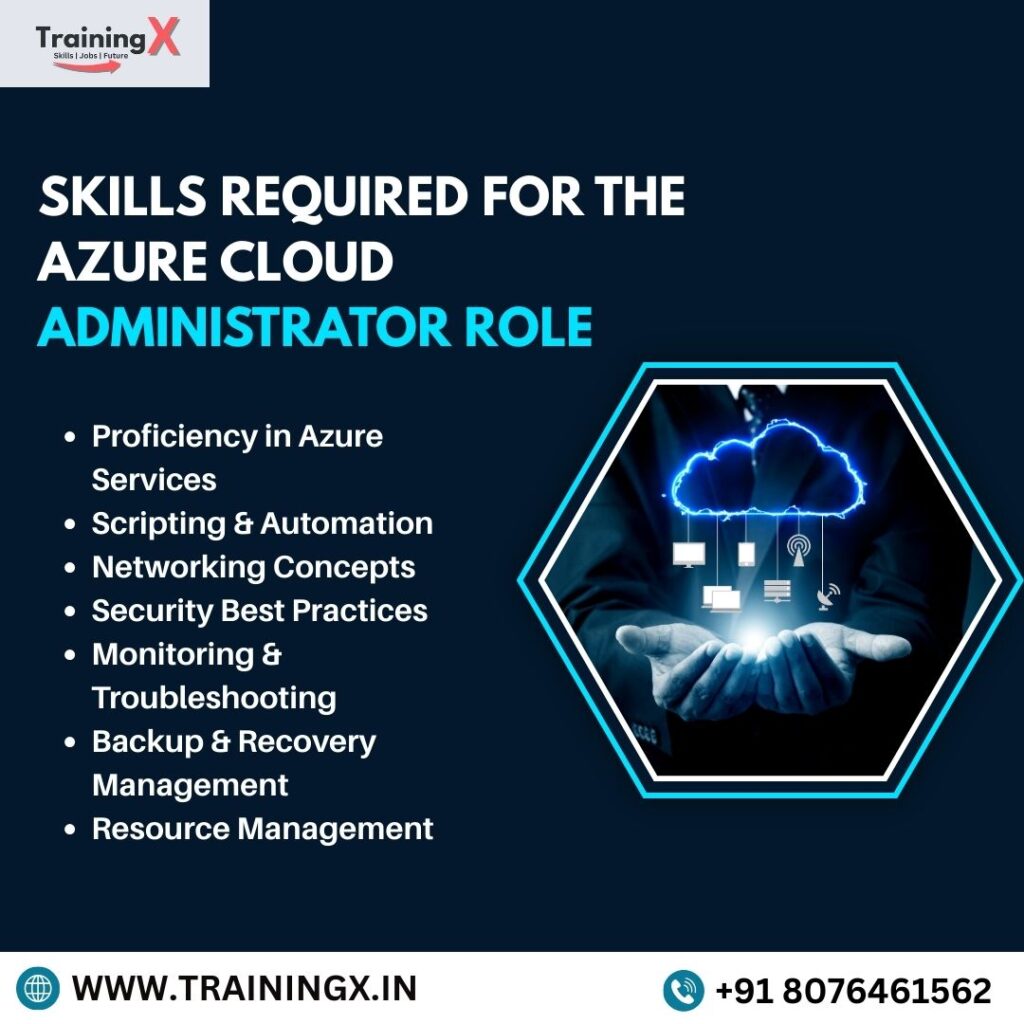As organizations move towards digitalization, cloud computing has become the backbone of modern IT infrastructure. But with this shift comes the challenge of managing complex cloud environments efficiently. Many companies struggle to maintain uptime, security, and performance without the right talent. That’s where the Azure Cloud Administrator job role steps in. These professionals are the go-to experts for configuring, monitoring, and securing Azure-based systems. If you’re tech-savvy and looking for a Sustainable career path, this role offers stability and endless opportunities.
Understanding the Role of an Azure Cloud Administrator in IT
An Azure Cloud Administrator handles the deployment, configuration, and monitoring of cloud resources on Microsoft Azure to ensure optimal performance and security. Their role includes configuring virtual networks, managing cloud storage, ensuring security, monitoring performance, and implementing backups. They play a crucial role in ensuring smooth, secure, and cost-efficient cloud operations. In the IT field, they bridge the gap between cloud infrastructure and business needs, supporting scalability, continuity, and digital transformation efforts.
Key Responsibilities of an Azure Cloud Administrator
The Azure cloud administrator job role includes a wide range of duties. Here’s what a typical day might look like:
- Managing Azure Subscriptions and Resources
An Azure Cloud Administrator plays a key role in managing subscriptions and resources, which define billing scopes, access permissions, and resource organization within Azure. Administrators can create multiple subscriptions to separate environments (like development, testing, and production) or departments within an organization.
Within each subscription, resources such as virtual machines, databases, and storage accounts are grouped and managed using resource groups. These groups allow centralized control, streamlined deployment, and easier monitoring. Azure Resource Manager (ARM) is the core service used to manage and automate resource provisioning through templates.
- Implementing and Managing Storage Solutions
Administering Azure storage solutions involves configuring and optimizing Blob, Disk, and File storage for performance and scalability. Administrators ensure data security, availability, and scalability while utilizing features like backups, disaster recovery, and automated tiering to optimize costs.
- Configuring and Managing Virtual Networks
Configuring and managing virtual networks in Azure involves setting up subnets, VPNs, and network security groups. Administrators ensure secure, scalable connectivity between resources while optimizing performance and network traffic flow.
- Managing Identity and Access
Managing identity and access in Azure involves configuring Azure Active Directory, setting up role-based access control (RBAC), and ensuring secure authentication. Administrators control user permissions and protect resources from unauthorized access.
- Monitoring and Securing Azure Environments
Monitoring and securing Azure environments involves using tools like Azure Monitor and Security Center to track performance, detect threats, and implement security measures. Administrators ensure compliance, data protection, and proactive issue resolution.
Skills Required for the Azure Cloud Administrator Role

To succeed in the Azure Cloud Administrator job role, candidates must develop a mix of technical and soft skills that allow them to manage, secure, and optimize cloud-based environments effectively.
1. Technical Skills
An Integrated core structure in core Azure services is essential. Azure Cloud Administrators should have hands-on experience with:
- Virtual Machines (VMs): Setting up, customizing, and overseeing virtual machines to run applications and handle various workloads efficiently.
- Storage Solutions: Working with Blob, Disk, and File storage for data handling and backup strategies.
- Virtual Networks: Setting up subnets, VPNs, and network gateways to enable secure communication between cloud resources.
In addition, understanding virtualization technologies like Hyper-V or VMware provides context for managing virtual resources efficiently. Proficiency in PowerShell scripting or using the Azure Command-Line Interface (CLI) is crucial for automating routine tasks, managing resources at scale, and improving administrative productivity.
2. Analytical and Troubleshooting Skills
Azure environments can become complex, especially in enterprise settings. Administrators must possess strong analytical thinking to interpret logs, performance metrics, and alerts effectively. When something goes wrong—be it a failed deployment or a connectivity issue—quick troubleshooting skills are essential to minimize downtime and restore services promptly. Knowing how to use tools like Azure Monitor, Log Analytics, and Network Watcher is vital for root-cause analysis and performance optimization.
3. Cloud Security Practices
With cyberattacks becoming more frequent and sophisticated, understanding and implementing cloud security best practices is non-negotiable. Azure Cloud Administrators must be able to:
- Set up Role-Based Access Control (RBAC) to efficiently assign and control user access and permissions across Azure resources.
- Use Azure Security Focal Point to assess security posture and respond to hazards.
- Implement network security groups (NSGs) and firewall rules to control traffic.
- Enforce compliance policies using Azure Policy and secure identities via Azure Active Directory.
Security awareness ensures that sensitive data and applications are protected, and compliance requirements are met. At TrainingX in Noida, you can gain comprehensive, hands-on training in all these areas. The program is designed to equip you with real-world skills that make you job-ready from day one, whether you’re just starting your career or upskilling for better opportunities in the cloud industry.
Become a Certified Azure Administrator with AZ-104 Training at TrainingX
If you’re serious about entering this field, the Microsoft Azure AZ-104 certification is the best place to start. This exam validates your skills in managing Azure subscriptions, implementing storage, configuring networks, and more. TrainingX in Noida offers expert-led training that aligns with the AZ-104 curriculum. The program provides practical lab sessions, mock exams, and mentorship—ideal for beginners and mid-level professionals alike.
Benefits of Getting Certified:
- Increases Job Market Visibility:
A globally recognized certification helps your resume stand out and increases your chances of being shortlisted by recruiters and employers looking for cloud professionals. - Boosts Salary Potential:
Azure-certified administrators typically earn higher salaries than those without certification, reflecting their validated skills and in-demand expertise. It demonstrates that you have verified, up-to-date skills valuable to organizations.
- Validates Your Expertise:
Certification proves your proficiency in key Azure administrative tasks such as managing subscriptions, configuring virtual networks, implementing storage, and securing environments. - Builds Confidence and Credibility:
With hands-on training and exams, you gain real-world experience that builds your confidence and adds credibility in interviews and workplace scenarios.
Career Opportunities and Salary Prospects
Becoming a certified Azure Cloud Administrator opens the door to many exhilarating career paths in the ever-growing cloud computing industry. With businesses rapidly shifting to cloud infrastructure, skilled professionals are in high demand. Job roles you can pursue include:
- Azure Cloud Administrator
- Cloud Support Engineer
- Systems Administrator – Azure
- Azure Infrastructure Engineer
- DevOps Associate
Regarding salary, entry-level Azure administrators in India can expect ₹4–6 LPA, while mid to senior-level professionals earn between ₹8–15 LPA or more. Internationally, Azure administrators can earn $80,000 to $120,000+ annually, depending on experience and region. Certification significantly enhances your earning potential and career growth in the cloud industry.
How to Prepare for the Azure Cloud Administrator Role
At TrainingX, we provide a structured pathway to help you prepare for the Azure Cloud Administrator role, ensuring you gain both theoretical knowledge and practical skills. Here’s how we guide you through the preparation:
- Comprehensive Azure Curriculum
- Hands-on Labs and Real-World Scenarios
- Mock Exams and Practice Sessions
- Expert Mentorship
- Industry-Relevant Insights
- Certification and Job-Ready Skills
Conclusion
The Azure Cloud Administrator role is your gateway to a thriving IT career, with endless opportunities and high demand. Equip yourself with real-world skills at TrainingX and become Azure-certified. Start today and elevate your career to new heights!
